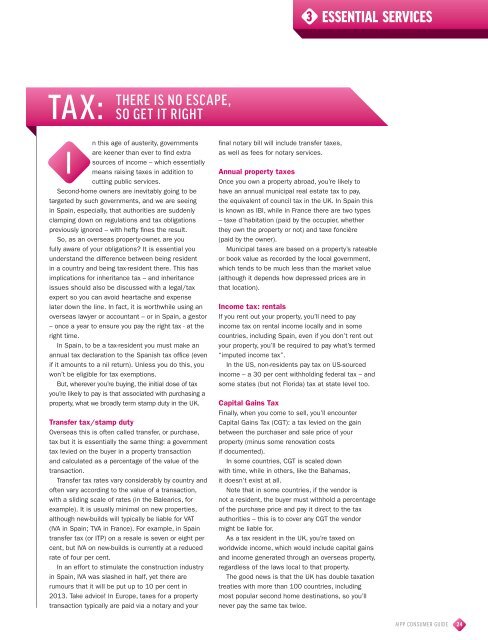How to Buy Overseas Property Safely - Turkish Connextions
How to Buy Overseas Property Safely - Turkish Connextions
How to Buy Overseas Property Safely - Turkish Connextions
You also want an ePaper? Increase the reach of your titles
YUMPU automatically turns print PDFs into web optimized ePapers that Google loves.
TAX:<br />
THERE IS NO ESCAPE,<br />
SO GET IT RIGHT<br />
n this age of austerity, governments<br />
are keener than ever <strong>to</strong> fi nd extra<br />
sources of income – which essentially<br />
I means raising taxes in addition <strong>to</strong><br />
cutting public services.<br />
Second-home owners are inevitably going <strong>to</strong> be<br />
targeted by such governments, and we are seeing<br />
in Spain, especially, that authorities are suddenly<br />
clamping down on regulations and tax obligations<br />
previously ignored – with hefty fi nes the result.<br />
So, as an overseas property-owner, are you<br />
fully aware of your obligations? It is essential you<br />
understand the difference between being resident<br />
in a country and being tax-resident there. This has<br />
implications for inheritance tax – and inheritance<br />
issues should also be discussed with a legal/tax<br />
expert so you can avoid heartache and expense<br />
later down the line. In fact, it is worthwhile using an<br />
overseas lawyer or accountant – or in Spain, a ges<strong>to</strong>r<br />
– once a year <strong>to</strong> ensure you pay the right tax - at the<br />
right time.<br />
In Spain, <strong>to</strong> be a tax-resident you must make an<br />
annual tax declaration <strong>to</strong> the Spanish tax offi ce (even<br />
if it amounts <strong>to</strong> a nil return). Unless you do this, you<br />
won’t be eligible for tax exemptions.<br />
But, wherever you’re buying, the initial dose of tax<br />
you’re likely <strong>to</strong> pay is that associated with purchasing a<br />
property, what we broadly term stamp duty in the UK.<br />
Transfer tax/stamp duty<br />
<strong>Overseas</strong> this is often called transfer, or purchase,<br />
tax but it is essentially the same thing: a government<br />
tax levied on the buyer in a property transaction<br />
and calculated as a percentage of the value of the<br />
transaction.<br />
Transfer tax rates vary considerably by country and<br />
often vary according <strong>to</strong> the value of a transaction,<br />
with a sliding scale of rates (in the Balearics, for<br />
example). It is usually minimal on new properties,<br />
although new-builds will typically be liable for VAT<br />
(IVA in Spain; TVA in France). For example, in Spain<br />
transfer tax (or ITP) on a resale is seven or eight per<br />
cent, but IVA on new-builds is currently at a reduced<br />
rate of four per cent.<br />
In an effort <strong>to</strong> stimulate the construction industry<br />
in Spain, IVA was slashed in half, yet there are<br />
rumours that it will be put up <strong>to</strong> 10 per cent in<br />
2013. Take advice! In Europe, taxes for a property<br />
transaction typically are paid via a notary and your<br />
fi nal notary bill will include transfer taxes,<br />
as well as fees for notary services.<br />
3 ESSENTIAL SERVICES<br />
Annual property taxes<br />
Once you own a property abroad, you’re likely <strong>to</strong><br />
have an annual municipal real estate tax <strong>to</strong> pay,<br />
the equivalent of council tax in the UK. In Spain this<br />
is known as IBI, while in France there are two types<br />
– taxe d’habitation (paid by the occupier, whether<br />
they own the property or not) and taxe foncière<br />
(paid by the owner).<br />
Municipal taxes are based on a property’s rateable<br />
or book value as recorded by the local government,<br />
which tends <strong>to</strong> be much less than the market value<br />
(although it depends how depressed prices are in<br />
that location).<br />
Income tax: rentals<br />
If you rent out your property, you’ll need <strong>to</strong> pay<br />
income tax on rental income locally and in some<br />
countries, including Spain, even if you don’t rent out<br />
your property, you’ll be required <strong>to</strong> pay what’s termed<br />
“imputed income tax”.<br />
In the US, non-residents pay tax on US-sourced<br />
income – a 30 per cent withholding federal tax – and<br />
some states (but not Florida) tax at state level <strong>to</strong>o.<br />
Capital Gains Tax<br />
Finally, when you come <strong>to</strong> sell, you’ll encounter<br />
Capital Gains Tax (CGT): a tax levied on the gain<br />
between the purchaser and sale price of your<br />
property (minus some renovation costs<br />
if documented).<br />
In some countries, CGT is scaled down<br />
with time, while in others, like the Bahamas,<br />
it doesn’t exist at all.<br />
Note that in some countries, if the vendor is<br />
not a resident, the buyer must withhold a percentage<br />
of the purchase price and pay it direct <strong>to</strong> the tax<br />
authorities – this is <strong>to</strong> cover any CGT the vendor<br />
might be liable for.<br />
As a tax resident in the UK, you’re taxed on<br />
worldwide income, which would include capital gains<br />
and income generated through an overseas property,<br />
regardless of the laws local <strong>to</strong> that property.<br />
The good news is that the UK has double taxation<br />
treaties with more than 100 countries, including<br />
most popular second home destinations, so you’ll<br />
never pay the same tax twice.<br />
AIPP CONSUMER GUIDE 24


